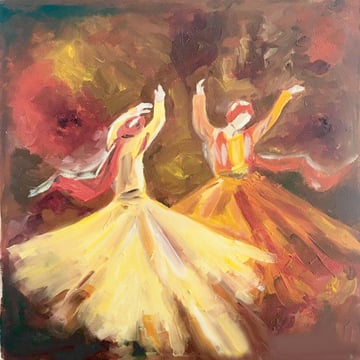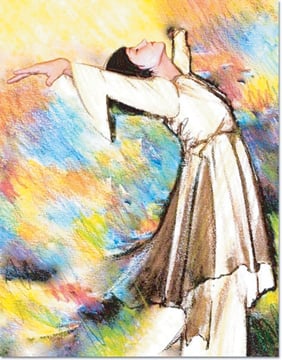An ode to the saint
Hands raised in the air, hair flowing onto shoulders draped in red and gold, eyes closed, lips pursed, body moving in a rhythm.
Shahbaz watches her in awe. She has turned from the girl he knows and loves into an unapproachable being. He hangs back, not daring to move in this Shrine of his childhood, as he watches her paying the tribute she has spent years practising for, to Lal Shahbaz Qalander.
Shahbaz leans against the wall, looking around worriedly, hoping no one would come this way to interrupt her. The shrine is most crowded at this time of the evening, so he had been astounded to be able to find a secluded corner for her to dance in.
Shahbaz remembers the sting of jealousy against this four- hundred-year-old man he had been named after. The one who had the ability to bring this look of affection in her brown eyes, the look that even he, the man who fought for her against his kin before finally making her his wife, had never won.
He remembers how her grip had tightened on the red and gold shawl, the embroidered cloth chadar she had showed him that night when they had met at the village well, the night of their engagement.
“I want a gift from you,” she had said, as the cold night breeze whipped their clothes and hair fiercely.
His face lit up and he jumped off his perch on the brick corners of the well.
“Ah, finally. What can I give, my lady?” he said, grinning like a school boy.
“After we marry,” she paused, a soft red blush rising onto her cheeks at the mention of the event. “After we marry, I want to go to the Shrine.”
“The Shrine?” He, who had been expecting to be asked for flowers, or jewellery, repeated in a puzzled voice.
“Of Lal Shahbaz?” He felt slightly betrayed.
“Yes,” she said, her fingers touching his softly. “The Shrine of Lal Shahbaz Qalander.”
He remembers the moon throwing the shadows of her long, beautiful eyelashes onto her cheeks, the warmth that crept into her voice when she said the Saint’s name.
“I’ve been to that place a thousand times. There’s nothing much to do over there.” He said dismissively, unable to hide his disappointment. “What will you do over there?”
She looked up at him, and he saw her deep brown eyes brimming with a longing he still didn’t understand.
“I want to dance at his Shrine.”
He had shrugged.
“I’ll take you, but that’s not a real wish. I want to give you something perfect.” He paused, then pressed her hand softly with his. “Something wonderful.”
She pressed his hand to her lips, but didn’t answer. As they sat side by side, the wind caressing them like a loving mother, he heard her singing softly to herself, and he felt lost in the mesmerizing beauty of her voice.
O, laal meri pat rakhiyo, bala jhoolelaalan,
Sindri da, Sehwan da,
sakhi shabaaz qalandar!
**********************
He sat silently in the grass, watching the villagers roam around. He had distanced himself from their simple Sehwan life slowly but surely over the last few years, staying more and more in Karachi, spending the summer and spring semesters studying instead of coming home to his birthplace, dear old Sehwan with her simple people and her ancient shrines.
His mother’s death had given him an excuse to finally stop returning to the village every few weeks; he knew that they were getting on quite well without him.
“Shahbaz,” he turned around to face his elder brother.
“Siku,” he said.
The difference between them was noticeable; he was the young village genius who was the favourite of every professor in the Philosophy department, his brother the farmer who toiled in the fields and danced in the Shrine, unashamed of his Sehwan.
His brother sank down beside him. “Father is quite sure you will be getting some very good proposals today.” He informed him drolly.
He nodded silently and looked away. He knew he would never marry in this place. He had wanted to tear himself apart from these people who lived their lives in the shadow of a shrine. Karachi, that great city, like a maze to his small, Sehwan bred eyes, ever-expanding, ever-hungry; it was his escape from Sehwan, which had become a noose of suffocation for an ambitious soul like him.
He had come back for his sister’s wedding. The girls from the village had gathered for the celebration; he saw a particularly good-looking one stand up, and gather her dress about her. She looked around with her heavy-lidded brown eyes, and then cast a glance towards him.
Shahbaz had read about love, and he had seen it happen on the screens of the huge Karachi cinemas, but he had never experienced it.
When he heard her husky voice, he realized he had finally fallen in love.
Duma dum mast kalandar,
Ali dum dum de andar.
Ali de dewaniyan ne kuch naiyo kehna,
Ali Ali kehna yaaro.. Ali Ali kehna.
**********************
“Shahbaz,” he comes to the present with a start. He half-rises, and the softest smile touches her lips.
“Dance with me,”
He watches her, shaking his head lightly.
“This is between you and your Saint.”
She has strung up a stage of love and devotion for herself, and he is afraid even to breathe lest he breaks it.
O, chaar charaag tere balan hamesha
Panjwa baalan aayi bala,
jhoole laalan
Sindri da Sehvan da sakhi Shabaaz Qalandar,
Ali dam dam de andar,
Dama dam mast Qalandar.
The arms stopping mid-air, the long slender back bowing down to the Shrine, the lips parted in thanks, the eyelids quivering with grateful tears that slide down the perfectly curved cheeks.
She runs towards him, into his arms, her eyes shining with tears, her lips quivering.
“I did it!” She whispers softly, as if she can’t believe it.
His lips twist into a soft, loving smile.
“It was the most wonderful dance in the world.”
“It wasn’t a dance,” she says, her brown eyes looking into his grey ones. “I was speaking to him. I spoke to him with my hands, my feet, my soul.”
He presses his lips to her forehead.
“I never knew I married a philosopher, my lady,”
“I never knew that’s what they called people like me,” she half-smiles, and his heart swells with love for this wonderful, beautiful creature Sehwan had given into his ungrateful, churlish hands.
“You’re out of breath.” He sets her down beside him on the cold stone floor. “Let me get some water for you, there was a stream nearby, I remember.”
“Remember? I thought you knew everything about the Shrine.”
“When I was a child I did, but it’s been years since your two ‘Shahbazes’ crossed paths.” He says as he walks out of the small door in one of the walls, hoping he to find the clay earthen pot by the stream, in the place he had always found it as a child, put there by lovers of Lal Shahbaz for any tired, thirsty traveller.
He hears her humming softly, singing to her Saint, and he smiles. Somehow, it feels all right that she loves this man, loves him more than she loves him; alive as he is, dead as the Saint is. Young as he is, old as the Saint is.
The sound is loud, explosive. The earthen pot he has bent to pick up from the dried grass shatters before his fingers touch it.
He whirls around, his heart stopping, yet beating, hammering inside his chest, yet going as quiet as a sparrow that has just seen its nest struck by lightning.
The cries and screams are terrible; they do not belong here. It is a place of love, laughter and dance. He has seen such scenes on TV only. The only red he has seen on a human is the henna on the hand he had held just last night.
His throat burns as he screams for her, as he tears through the small door into the verandah and sees the mutilated, broken body the explosion has thrown against the wall of the Shrine.
Shahbaz’s fingers search for a pulse.
“No, please,” a sob escapes him. “No, No, No please!”
His fingers clutch the hair, the brittle fingers, his hand traces the burnt, bloodied face, the swollen lips, the forehead dented with the fall.
“No, please, give her back.”
He is alone. In a place crowded with people, crowded with death and pain and agony, he is completely alone.
He calls the Saint who has watched over him since his childhood.
“Please give her back!”
He understands that Sehwan has finally taught a lesson to her thankless son.
**********************
On the evening of 17th February, 2017, a young man trudged up to the Lal Shahbaz Qalander Shrine with his hands soiled from the dust of his wife’s fresh grave, a red-gold embroidered shawl draped around his shoulders.
He walked into the Shrine as he had walked into it countless times before, but instead of loitering around like he had done as a child, he spread his arms, and for the first time, he danced.
Around him, the lovers of the Red-robed Saint crowded. Slowly, slowly other arms spread, other feet stamped to a rhythm and countless voices began to echo, singing a symphony four hundred years old.
Har dam peera teri khair hovey,
Naam-e-Ali, beda paar laga, jhoole laalan,
Sindri da Sehwan da sakhi Shabaaz Qalandar,
Dama dam mast Qalandar,
Ali dam dam de andar
This story is an attempt to bring forward Sehwan’s spirit. On the 16th of February, Sehwan witnessed a blast at Lal Shahbaz Qalander’s shrine. And, on the 17th, it saw many men, women and children from the local population return without any fear for their safety, and dance to their Saint again. There were many people who had lost their family members at that very spot just one day earlier, and yet without any prior planning, these people just gathered there and danced.